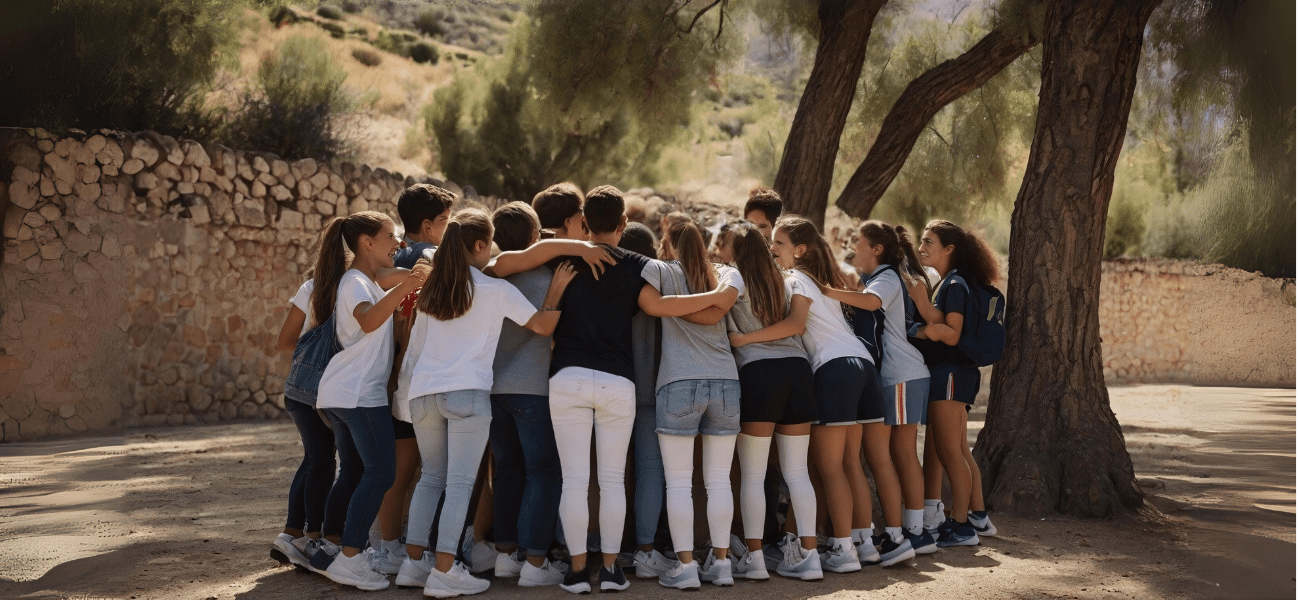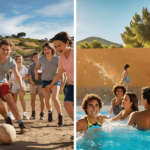If you’re a parent gearing up to move your family to Spain this summer, you’re likely filled with a mix of excitement and apprehension. You may be wondering if your teen will adjust well and how you can help them prepare for the Spanish school system starting in September. One solution that is often overlooked are Spanish summer camps, or “Campamentos de Verano.” These camps offer a low-stress environment where teens can socialize, learn the language, and have fun discovering the culture through experience. This makes a practical option for those in Spain short term or moving permanently. Here’s an overview of the types of summer camps found in Andalusia for teens aged 12 to 17, offering a range of activities, price levels and a guide for selecting the right camp. This same information can be generally applied to other regions in Spain with minor differences in time availability and activities offered.
Benefits of Summer Camps for International Teens
Spanish summer camps are ideal for teens to experience immersion in Spanish language and culture within a shorter time frame. Unlike the high-pressure environment of a year-long school, camps are designed around games and activities that naturally encourage interaction and language practice. As Spanish kids are on vacation too, this creates a relaxed atmosphere with more adult guidance, resulting in an inclusive environment where new arrivals can integrate smoothly and confidently.
However, if you’re hoping that your kids will come home with new best friends who live just around the corner, the chances are slim. Many kids come from all over a region to attend camp and have been attending for years, looking forward to seeing the same friend groups annually. Your teen is likely to bond with “camp friends,” boosting their self-confidence to repeat the experience once school begins. Think of it as a trial session, observing how Spanish teens interact, learning popular songs, slang, and daily behaviors—all of which will help immensely when starting a new high school in September.
Types of Summer Camps Available in Spain
Attending summer camp in Spain is not as widespread as in the US. Most kids and families prefer spending the summer months hanging out with friends and relatives. Summer jobs are also not common in Spain with the legal working age being 16 years.
Thus summer camps are limited to five classic categories:
- Language Camps: Designed to enhance language skills through immersive experiences, these camps combine traditional activities with structured language classes, cultural excursions, and interactive workshops like skits.
- Sports Camps: For sports enthusiasts, these camps are highly competitive and focus on specific sports like fútbol (soccer), basketball, tennis, and sailing. They provide professional coaching, tournaments, and team-building exercises. Most Spanish kids who attend are serious about continuing professionally.
- Adventure Camps: Perfect for teens who love the outdoors and need challenging activities. These camps offer casual outdoor activities such as hiking, kitesurfing, surfboarding, kayaking, and zip-lining, helping build teamwork and leadership skills while exploring Andalusia’s natural beauty.
- Arts and Creative Camps: Blending artistic activities like theater, music, singing, and dance, these camps cater to teens who thrive on creative expression. By the teenage years, some camps are more competitive, but for non-sporty kids, these camps offer a space to find Spanish friends with similar interests.
- Technology Camps: For tech-savvy and academically oriented teens, these camps focus on coding, robotics, and other STEM fields, with options increasing each year as Málaga becomes a popular tech hub.
Day Camps
Day camps are where your teen goes at 9 am and returns by lunch (around 3 pm), offer a structured yet less intense experience. This can be particularly beneficial for anxious or easily overwhelmed teens who need the comfort of returning to a familiar and safe environment each night. Day camps are also ideal for teens who require special diets or medications, ensuring they can maintain their routine without the challenge of managing these needs alone in a sleep away camp setting.
Advantages
- Affordable, average €40-150 week
- Many are single activity camps, focusing on sports such as skateboarding, surfing or martial arts; ateliers for painting, drawing, ceramics, musical instruments and academic tutoring often fall into this category.
- Introduces parents to local small businesses and organizations that offer year-round classes.
- Often provide discounts for siblings or returning students in year long classes.
Limitations
- Often only discovered by walking around a neighborhood, looking for flyers attached to lamp posts, school bulletin boards, and word of mouth.
- Limited sessions for only 1-2 weeks during the entire summer, making early planning essential.
- Classic camp activities such as skits, songs and field activities are not included within the shortened day.
For teens who might find full-day socialization and learning in a foreign language overwhelming, day camps provide a balanced approach, combining immersion enrichment with the stability of familiar home life.
Sleep away Camps
Most teens will be ready for the independence of a sleep away camp. However with a quick online search parents will notice that finding and comparing sleep away camps in Spain is more difficult than in the US. Only a handful of choices come up, with smooth websites and high price tags. Affordable sleep away camps attended by average Spanish kids requires more effort to find, often being subsidized by the government and lacking comprehensive websites or outdated landing pages.
Private/International Camps
- Cost: €800 – €2000 per week
- Superior accommodations (air-conditioned cabins, modern facilities)
- Gourmet meals accommodating various dietary restrictions
- Experienced, often bilingual and older counselors
- Include specific language classes and cultural excursions
- Luxury activities (i.e. horseback riding, white-water rafting, zip-lines and theme park trips)
- Organized transportation from major cities
Subsidized Camps
- Cost: €250 – €400 per week
- Simple lodgings (basic bunk beds, communal bathrooms)
- Traditional camp cuisine (carbs, dairy and processed meats)
- Young, enthusiastic counselors with basic English skills or no English
- Focus on accessible outdoor adventures (i.e.pool & field games, hikes, treasure hunts)
- Parents need to arrange travel to camp locations, often in remote areas
These camps offer different overall experiences, yet both options provide the opportunity to foster personal growth and create lasting memories.
Choosing the Right Camp
How do you go about selecting the right camp for your child? While budget is always a factor, it’s best to start with a goal. Why is your child going to camp? To learn independence, make new friends, immerse in the local language, develop further skills? Narrow it down to one or two goals.
Next, consider your child’s personality. For example, if your teen suffers from social anxiety and prefers indoor activities, sending them to a large, sports-focused camp might result in an anxious, unhappy teen. Instead, opt for a smaller, general camp that allows them to try various activities and meet Spanish kids who share similar personalities and interests.
Other Considerations
- Special Needs: Dietary requirements, allergies, mental or physical accommodations are priorities that will quickly narrow down the options.
- Transport: Are you willing to rent a car and drive several hours if necessary to drop off/pick up your child? If not, private camps with organized transportation might be a better fit.
- Peer Group: Look at the campers in photos on social media or websites. Camps with diverse ethnicities may be more inclusive, but might also mean more English-speaking and less Spanish immersion.
- Language Level: Ensure the camp offers programs suitable for your teen’s current Spanish proficiency. An A1 level might not be enough for local camps and could pose a safety issue if they can’t understand warnings in Spanish.
- Timing: Camps run during July, as Spanish schools finish the last week of June. Many families travel in August, but an increase in available camp dates extends into mid-August. All camps finish before the first week of September.
- Discounts: Many camps offer sibling discounts of 5-10%, and some allow siblings to bunk together if requested.
Choosing the right summer camp can provide your teen with a smoother transition to their new life in Spain, helping them to make friends, learn the language, and understand the local culture before starting school in September.
Dive Deeper: Resources
Interested in more information about Spain’s summer camp experience? Be sure to check out the other posts in our series for more essential tips and insights. Discover what to expect during a sleep-away camp, learn how to apply to camps efficiently, and get our recommended packing list for a smoother first-time experience. Equip yourself with all the information you need to ensure your teen has an unforgettable summer in Spain!


